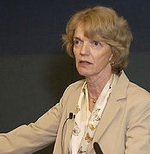Reading on: Neuroscience and free will
Churchland, Patricia Smith Brain-Wise: Studies in Neurophilosophy The MIT Press, Cambridge, MA 2002 [abstract – 480 words]
Without the assumptions of personal agent control, choice, and responsibility, human social commerce is hardly conceivable. Mechanisms for keeping the social order seem to be part of what evolution has bequeathed to our brain circuitry. If the reward and punishment system is to be effective in shaping social behavior, the actions for which the agent is rewarded or punished must be under the agent’s control. What does under control mean?
One point of view of free will and control rests on a contrast between being caused to do something and not being so caused. This is the idea that for any choice to be free, it must be absolutely uncaused. The philosopher David Hume showed forcefully that our free choices and decisions are in fact caused by other events in the mind: desires, beliefs, preferences, feelings, and so forth.
Hume made the deeper and more penetrating observation that an agent’s choices are not considered freely made unless they are caused by his desires, intentions, and so forth. Randomness, pure chance, and utter unpredictability are not preconditions for attribution of responsible choice. If a person’s actions where not caused by events in his mind, if there were no reasons for his actions, his sanity would be seriously in doubt. His actions would be out of his control.
The brain appears to be a causal machine. So far, there is no evidence at all that some neuronal events happen without any cause. Though all events in the brain may be caused, this does not imply that actions are predictable. The brain is so complex it is not physically possible to take all the relevant measurements neuron-by-neuron or synapse-by-synapse and perform all the relevant computations to grind out a precise prediction. Causality and unpredictability are entirely compatible and “unpredictable” does not imply “uncaused.”
The idea that quantum randomness in the physical world is somehow the key to what makes free choice free remains appealing to those inclined to believe that free choice must be uncaused choice. If quantum indeterminacy is, somehow, the basis of free choice, what is the mechanism of amplification of the non deterministic quantum events into the macro physical world?
However, the absolutely crucial point is that not all kinds of causes are consistent with free choice. What are the differences among causes of behavior such that some kinds play a role in free choice and others play a role in forced choice. Are there systematic brain-based differences between voluntary and involuntary actions that will support the notion of agent responsibility? This is the crucial question, because we do hold people responsible for what we take to be their actions. When those actions are intentionally harmful to others, punishment, varying from social disapproval to execution, may be visited upon the agent. When, if ever, is it fair to hold an agent responsible? When, if ever, is punishment justified?


